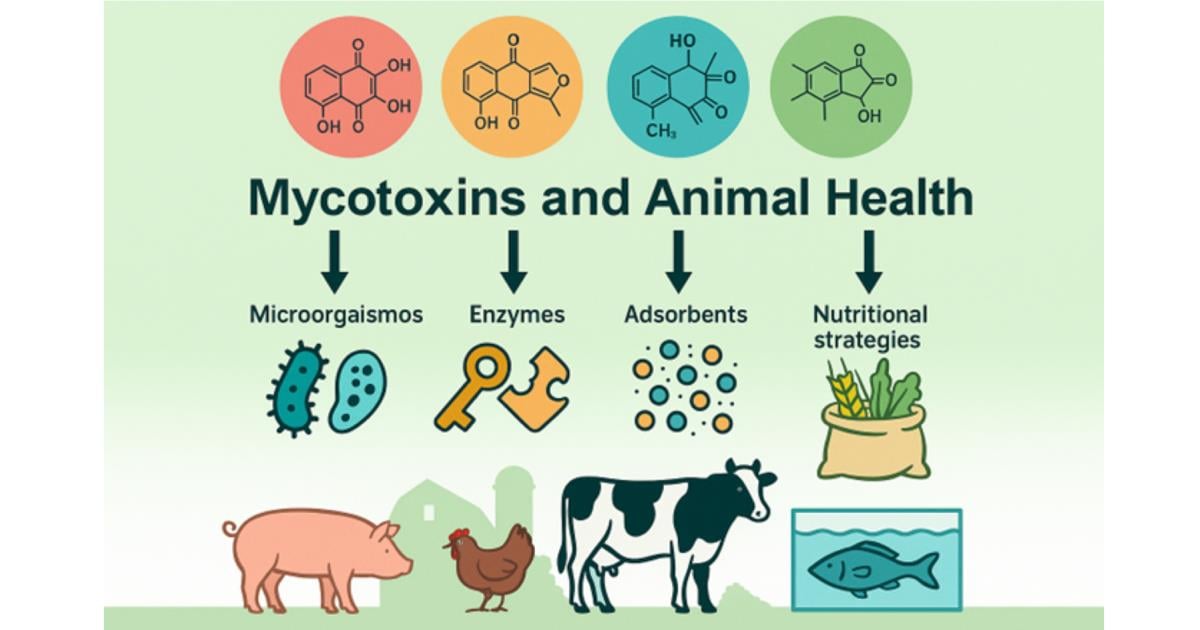- 4.0Impact Factor
- 8.2CiteScore
- 19 daysTime to First Decision
Mycotoxins and Animal Health: Mechanisms, Impacts, and Mitigation Strategies
This special issue belongs to the section “Mycotoxins“.
Special Issue Information
Dear Colleagues,
Despite decades of research, mycotoxin contamination remains a complex problem, often involving multiple toxins with additive or synergistic effects. Recent advances in molecular biology, veterinary toxicology, and nutritional science have paved the way for innovative approaches to mycotoxin control — including novel adsorbents, microbial and enzymatic detoxification methods, genetic selection for resilience, targeted nutritional interventions, and precision feeding strategies. Importantly, these solutions must be evaluated not only for their efficacy in reducing toxin exposure but also for their impact on overall animal performance, product quality, and farm profitability.
This Special Issue of Toxins will focus on the current state of knowledge and recent advances in understanding the mechanisms of mycotoxin toxicity, assessing their health and production impacts in livestock and aquaculture, and evaluating practical mitigation strategies. We welcome original research articles, reviews, and methodological papers that
- Elucidate biochemical, cellular, and physiological pathways affected by mycotoxins in animals.
- Assess the effects of mycotoxin exposure on animal health, productivity, and product safety.
- Evaluate the efficacy, safety, and cost-effectiveness of novel detoxification and mitigation methods.
- Investigate interactions between mycotoxins, pathogens, and other environmental stressors in animal production systems.
Submissions that demonstrate clear practical relevance — such as improvements in animal performance, health status, or production economics — are particularly encouraged. Studies addressing multiple mycotoxins, emerging contaminants, or the combined impact of toxins and management factors are also within the scope of this Special Issue.
Dr. Łukasz Żielonka
Guest Editor
Manuscript Submission Information
Manuscripts should be submitted online at www.mdpi.com by registering and logging in to this website. Once you are registered, click here to go to the submission form. Manuscripts can be submitted until the deadline. All submissions that pass pre-check are peer-reviewed. Accepted papers will be published continuously in the journal (as soon as accepted) and will be listed together on the special issue website. Research articles, review articles as well as short communications are invited. For planned papers, a title and short abstract (about 250 words) can be sent to the Editorial Office for assessment.
Submitted manuscripts should not have been published previously, nor be under consideration for publication elsewhere (except conference proceedings papers). All manuscripts are thoroughly refereed through a double-blind peer-review process. A guide for authors and other relevant information for submission of manuscripts is available on the Instructions for Authors page. Toxins is an international peer-reviewed open access monthly journal published by MDPI.
Please visit the Instructions for Authors page before submitting a manuscript. The Article Processing Charge (APC) for publication in this open access journal is 2700 CHF (Swiss Francs). Submitted papers should be well formatted and use good English. Authors may use MDPI's English editing service prior to publication or during author revisions.
Keywords
- Mycotoxins
- feed contamination
- detoxification strategies
- microbial degradation
- enzymatic detoxification
- adsorbents
- nutritional inter-ventions
- veterinary toxicology

Benefits of Publishing in a Special Issue
- Ease of navigation: Grouping papers by topic helps scholars navigate broad scope journals more efficiently.
- Greater discoverability: Special Issues support the reach and impact of scientific research. Articles in Special Issues are more discoverable and cited more frequently.
- Expansion of research network: Special Issues facilitate connections among authors, fostering scientific collaborations.
- External promotion: Articles in Special Issues are often promoted through the journal's social media, increasing their visibility.
- e-Book format: Special Issues with more than 10 articles can be published as dedicated e-books, ensuring wide and rapid dissemination.

